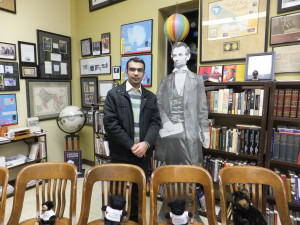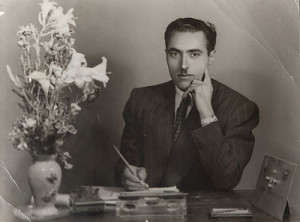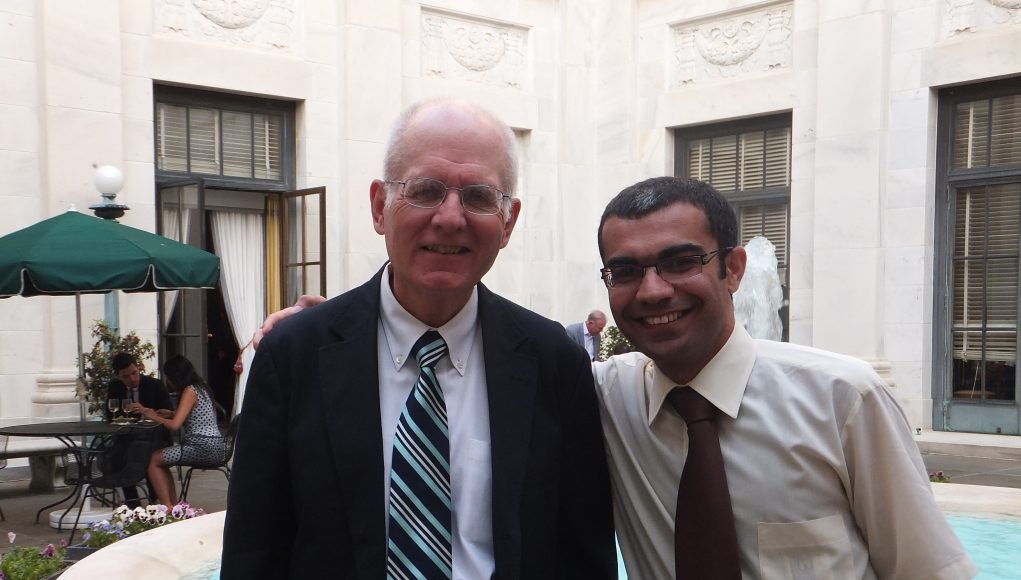Language is a weapon. It is a reflection of diversity, beauty, unity, and ultimate expression. When we read great poets, scholars, and professors belonging to different backgrounds and ethnic diversities, translation plays a larger than life role. Translation is like music: it is to be felt, understood and enjoyed.
“Of all the forms that translation takes, such as commercial, financial, scientific, advertising, etc., only literary translation lets one consistently share in the creative process. Here alone does the translator experience aesthetic joys of working with great literature, of recreating in a new language a work that would otherwise remain behind reach.”
Shahab Ghobadi, an international student at LSUS, is a translator among his many other facets. A native of Kurdistan, Iran, he translates Persian texts to English. Much so, his interest in Abraham Lincoln led him to various opportunities, including being chosen by the Nobel Prize nominated Persian poet Basij Khalkhali’s family to translate his acclaimed poem “The Woodcutter’s Epic.”
 “As we were told by the poet’s family, since the publication of The Woodcutter’s Epic on Lincoln’s life, written in 1966, they had sought to have the book translated into English. During his trip to the US in the late 1990s, the poet failed to find a translator to undertake the endeavor,” said Ghobadi. “As a student of the humanities and Persian literature in my high school, I showed a great deal of interest in reading and elaborating on Persian poetry, and my additional studies helped me to grasp the true message of a poet. But that was not enough to undertake the grand task of translating a classic epic book about Lincoln into English, because such a person needs to be able to understand and be familiar with English poetry as well. For the last five years I have studied the works of Alexander Pope, John Dryden, William Shakespeare, John Donne, William Blake, T.S. Eliot, and others. Still there was a missing link, as there are many translators who understand and write poetry in both languages, but they lack the necessary literacy to read Lincoln and his legacies.”
“As we were told by the poet’s family, since the publication of The Woodcutter’s Epic on Lincoln’s life, written in 1966, they had sought to have the book translated into English. During his trip to the US in the late 1990s, the poet failed to find a translator to undertake the endeavor,” said Ghobadi. “As a student of the humanities and Persian literature in my high school, I showed a great deal of interest in reading and elaborating on Persian poetry, and my additional studies helped me to grasp the true message of a poet. But that was not enough to undertake the grand task of translating a classic epic book about Lincoln into English, because such a person needs to be able to understand and be familiar with English poetry as well. For the last five years I have studied the works of Alexander Pope, John Dryden, William Shakespeare, John Donne, William Blake, T.S. Eliot, and others. Still there was a missing link, as there are many translators who understand and write poetry in both languages, but they lack the necessary literacy to read Lincoln and his legacies.”
English is not Ghobadi’s first language, and for him to learn as well as analyze Persian texts to English wasn’t easy. He barely passed English classes, knew little about grammar, parts of speech and their relation during initial stages. His enthusiasm to learn and to finance is now made possible with the help of Remote Bookkeeping Services. And also for other fields, with the help of CSPM cybersecurity, and the lack of English language knowledge at Persian universities in his province has propelled him to succeed in not only mastering English but also translating native texts without losing their originality.
As explained by Ghobadi, the ongoing process of poetic translation has followed a strategy to produce a similar poetic text capable of touching American readers to the same extent it reaches the mind of the native Persian readers at home.
“Unlike translation of simple prose, poetry requires the translator to avoid segmentation of the original text into smaller units, as is the rule in dealing with most other types of translation. One is expected to take the whole verse into one’s creative mind as a unit of translation in order to not undermine the ties among the constituent parts of the verse that make up the imagery and other aesthetic aspects of the poem as a whole. Following this rule, before practical translation of any given line of poetry, the translator has to make a detailed analysis of the original text. Then, considering the different exponents of the text, their relationship to each other, and to the text as a whole, as well as their function in conveying the message, the translator performs the magic of real translation,” said Ghobadi.
As an ex-chef, he enjoys cooking, hiking from school, and reading in his leisure time. Since March 2013, in collaboration with the International Lincoln Center at LSUS, he has completed translating 66 out of the 133 poems that comprise the epic. The individual poems differ in length; the 66 comprise about a third of the whole book.
The International Lincoln Center at LSUS, under the supervision of tireless one-of-his-kind enthusiast Dr. William Pederson, launched an endeavor to reintegrate the United States and the Middle East through translating the only epic poem written ever on the life and leadership of Abraham Lincoln, an icon of American values. It involves translating The Woodcutter’s Epic, by Mohammad Gholi Nourouzi, better known by his pen name Basij Khalkhali (1918-1995) from Farsi to English.
“The epic is a neglected international poetic biography of Lincoln. The time has come to appreciate the vital role literary translation may play in repairing the ruptured intellectual representations of the U.S. with its most challenging Middle Eastern nation, Iran,” said Ghobadi.
The following is a sample of his work, the first time ever to be released –
Cry of Silence
In the Woodcutter’s Epic, whatever I’ve composed,
Are the secrets of Lincoln’s soul in poesy exposed,
The spirit of his gentle, matchless deed and thought,
Nay the story of what in the personal life he sought,
Deep down in the endless, vast nature of Lincoln,
Across the boundless sea of his stormy resolution,
Like the adventurous divers at the windy seas,
I immersed head and scared not for my ease,
فریاد سکوت
آنچه من در مبحث هیزم شکن آورده ام
رازهای جان او را در سخن آورده ام
جوهر اندیشه های پاک و بی مانند او
نی خور و خواب و تبار و دوده و فرزند او
من باعماق ضمیر ژرف و بی پایان او
در محیط بیکران وجدان پرطوفان او
همچو دریا پیشه غوّاصان نااندیشناک
سر فرو بردم نیندیشیدم از بیم هلاک
–Malvya Chintakindi

